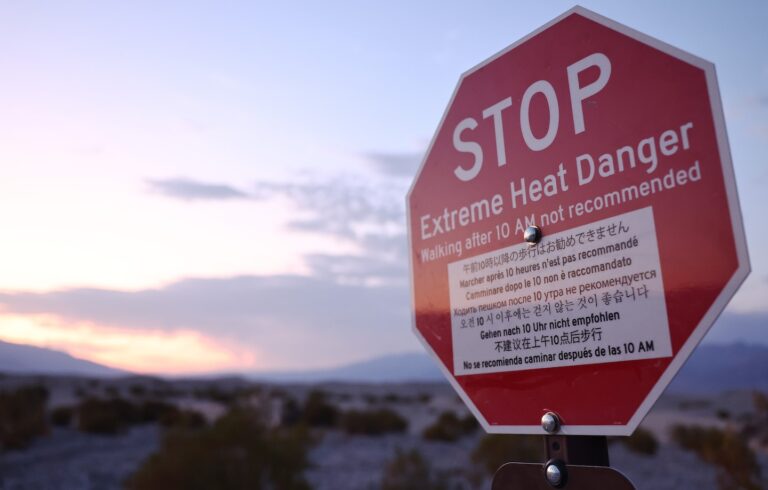In the West, Phoenix, Las Vegas, San Jose, Spokane, Washington, and Boise, Idaho, are all under extreme heat warnings. In the East, extreme heat watches and warnings have been issued for areas stretching from South Carolina to Massachusetts, including Washington, Baltimore, Philadelphia and Boston. The heat index, which takes into account both temperature and humidity, is expected to reach 105 to 110 along much of the Interstate 95 corridor.
Vast swaths of the Lower 48 states are expected to endure “severe” to “extreme” heat risk levels, or at least Level 3 on the federal government’s scale of 0 to 4.
The risk of heatstroke at Level 4, the most sustained and widespread “extreme” level, is concentrated in the desert Southwest. On Sunday, Las Vegas recorded its highest temperature on record, 120 degrees.
More heatwaves are expected, especially in the west.
The most extreme heat will hit the western U.S. for the rest of the week, with record heat expected on Wednesday in parts of Washington, Oregon, Idaho, California, Nevada and Arizona.
Las Vegas is expected to reach a high of 119 degrees both Wednesday and Thursday. Those would be the hottest temperatures on record if not for Sunday’s high of 120. If Las Vegas’ high reaches at least 115 degrees on Wednesday, it will mark the fifth consecutive day that temperature has been recorded.
Areas from Las Vegas to parts of Southern California and Arizona are expected to see highs above 120 degrees Fahrenheit through Friday.
Heatwaves with triple-digit temperatures will continue to batter much of eastern Washington, the Snake River Valley of Idaho, and northern Western Canada, including much of the Great Basin.
For the rest of the week, high temperatures are expected to reach at least 110 degrees Fahrenheit across much of California’s Central Valley.
By the weekend, temperatures are expected to remain above record highs in most areas as moisture from the south increases with the start of the southwest monsoon season, but fall below record highs.
But the thermal dome – the intense pressure zone that causes the unusually high temperatures – is predicted to remain largely intact.
A predicted cold front will provide some relief for the eastern U.S. on Thursday and Friday, but temperatures will return over the weekend and into next week.
The heat set hundreds of records.
Hundreds of heat records have been set in the U.S. since the beginning of July, primarily in the Western United States. According to data compiled by the Southeast Regional Climate Center, through July 9, the maximum temperature records were about 20 times higher than the minimum temperature records. On July 5, 6, and 7, about 300 heat records were set each day.
Many locations in the West recorded at least four calendar-day record high temperatures in the first nine days of the month, including Reno and Las Vegas in Nevada, Bishop and Redding in California, and Portland and Medford in Oregon.
Record temperatures are being recorded almost every day elsewhere in the West. On Tuesday, Barstow, California, about halfway between Los Angeles and Las Vegas, recorded a high of 118 degrees, tying the all-time record for the third day in a row.
Several other locations also recorded record highs, including Palm Springs, California (124 on Friday), Redding (119 on Saturday) and Las Vegas.
In Death Valley, the temperature reached 129 degrees Fahrenheit on Sunday, one of the warmest on record, and the seven-day average high temperature was 126.3 degrees Fahrenheit.
In the East, temperatures in Raleigh, North Carolina, reached 106 degrees on Friday, also a record high.
The sustained heat has been particularly notable, with many locations reporting one of their hottest weeks on record (7 consecutive days), including:
- Las Vegas: The average high temperature reached 115.4 degrees, beating 2005’s record of 115.1 degrees for the hottest week.
- Bishop, California: The average high temperature was 108.4 degrees, making it the hottest week of 2021, topping out at 107.4 degrees.
- Medford: The average high temperature was 106.4 degrees, making it the second-hottest week on record, behind 1981’s 108.4 degrees.
- Palm Springs: Fourth hottest week with an average high temperature of 117.7 degrees.
In Washington, DC, the average temperature was 88.7 degrees Fahrenheit, making it the fourth-warmest five-day period on record.
Climate Connection
Scientific studies have found that human-induced climate change is increasing the intensity, frequency and extent of heat waves.
Human-induced climate change has made recent high temperatures four to five times more likely in much of the West, and two to three times more likely in the Mid-Atlantic and Northeast, according to the Climate Change Index from science communications company Climate Central.
The planet has recorded 13 consecutive months of record warmth, with the United States experiencing its second-warmest year ever.
Jason Samenow contributed to this report.

